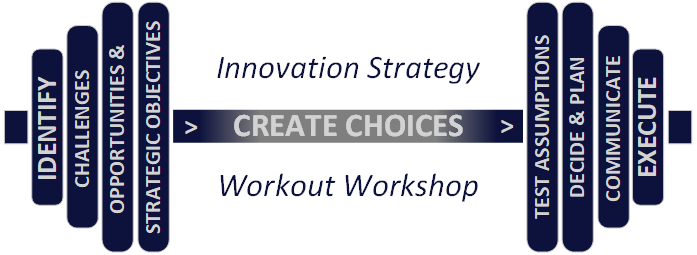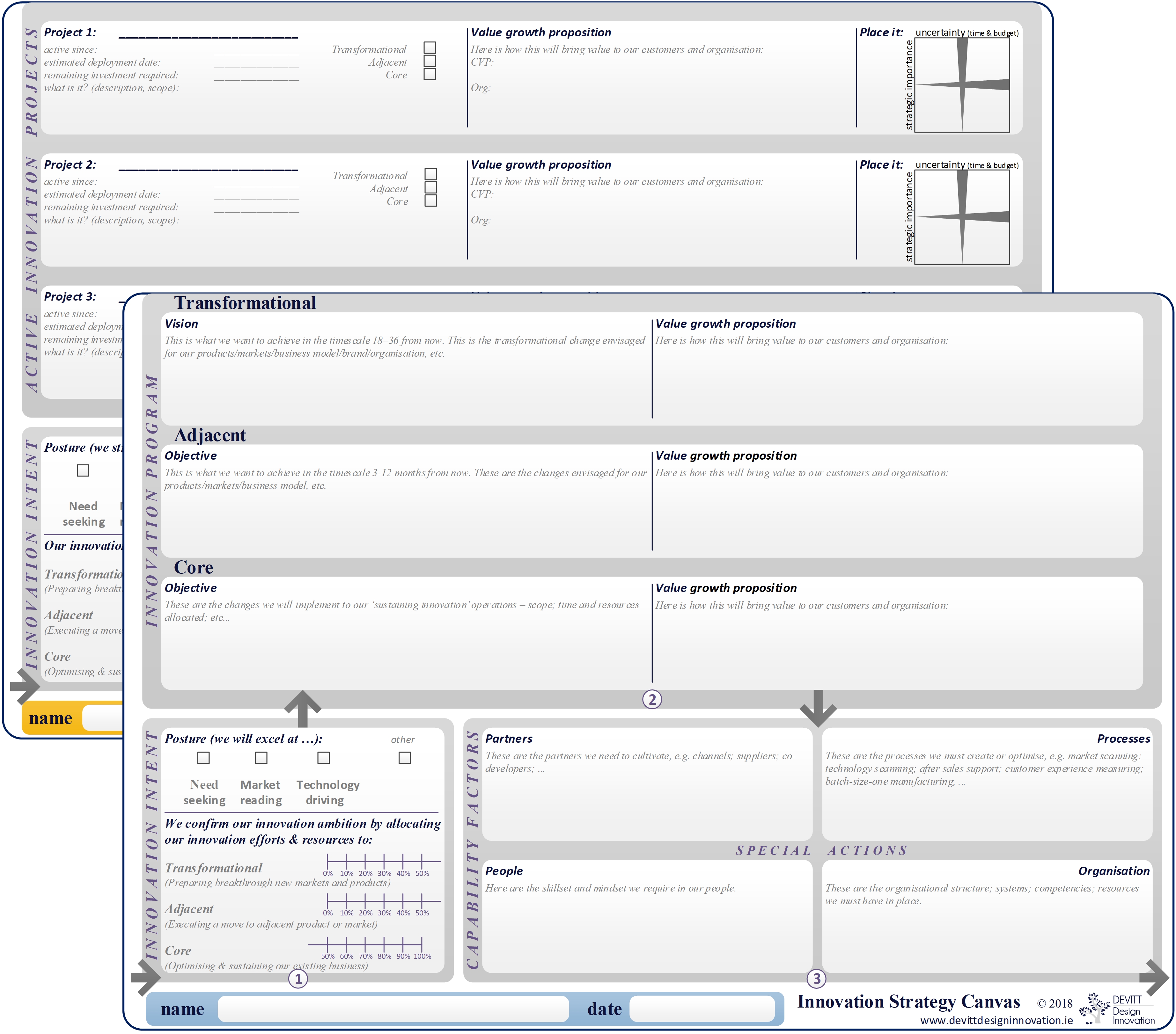Innovation Strategy Workout
In most organisations, effective innovation is hindered by poor coordination, resulting in a pattern of ‘random acts of innovation’. According to a recent pwc study: “Strategy, not size, matters in innovation spend”.
Making strategy means making decisions. But, a 'rock' and a 'hard place' shouldn't be the only two options. More, and better, options create better decisions.
In the face of growing challenges from a business’s strategic aspirations, its market threats and resource restrictions, leaders can't rely just on intuition and spur-of-the-moment decisions. Our Innovation Strategy Workout guides leadership decision-making that ends with an agreed vision and a roadmap of coordinated activities. This is the essence of an innovation strategy.
Along the way to a better decision, you have to give yourself more than one option, which alone might have unacceptable compromises or unachievable objectives. Our process guides you to create at least three distinct innovation program options (possible strategies, including the status quo) and to select the best through rigorous testing.

Understand the business's capability + market forces
2. RESEARCH
Identify strategic drivers: objectives, challenges and opportunities
3. REFRAME
Construct an innovation vision and posture for your organisation.
4. IDEATE
Generate strategic action possibilities. What might be in your portfolio of strategic innovation actions over the coming year (or 2/3/5 years, as appropriate)? Agree a shortlist of strategic action possibilities.
For each strategic action, identify the key barriers (tangible and supposed) that need to be overcome in order to make the strategic action attractive.
Find supportive evidence for the likelihood of overcoming each barrier.
Shortlist the strategic actions by comparing supportive evidence for each. Consider also the sustaining innovation project requirements.
6. EXECUTE
Agree the portfolio of strategic innovation supportive actions, including sustaining innovation projects.
Plan implementation for each strategic action, with budget and resource requirements
Design the narrative and collateral for communicating the strategy to all stakeholders

1. AUDIT the present environment
Understand the business's capability + market forces
2. RESEARCH
Identify strategic drivers: objectives, challenges and opportunities
3. REFRAME
Construct an innovation vision and posture for your organisation.
4. IDEATE
Generate strategic action possibilities. What might be in your portfolio of strategic innovation actions over the coming year (or 2/3/5 years, as appropriate)? Agree a shortlist of strategic action possibilities.
5. VALIDATE
For each strategic action, identify the key barriers (tangible and supposed) that need to be overcome in order to make the strategic action attractive.
Find supportive evidence for the likelihood of overcoming each barrier.
Shortlist the strategic actions by comparing supportive evidence for each. Consider also the sustaining innovation project requirements.
6. EXECUTE
Agree the portfolio of strategic innovation supportive actions, including sustaining innovation projects.
Plan implementation for each strategic action, with budget and resource requirements
Design the narrative and collateral for communicating the strategy to all stakeholders
We’ll facilitate a workshop with your business’s key decision makers to help achieve clear strategic direction for your innovation activities. A big benefit is enthusiastic buy-in from anyone that has been involved in its creation.
We usually facilitate this workshop over three days; but, other formats are possible. A typical three-day schedule goes something like below, with many adaptations as required for a firm’s special circumstances.
We’ll facilitate a workshop with your business’s key decision makers to help achieve clear strategic direction for your innovation activities. A big benefit is enthusiastic buy-in from anyone that has been involved in its creation.
We usually facilitate this workshop over three days; but, other formats are possible. A typical three-day schedule goes something like below, with many adaptations as required for a firm’s special circumstances.
Day 1Audit the present environment.Identify business objectives and market opportunities.Generate strategic action possibilities.
Day 2Shortlist the strategic action possibilities.Explore barriers, and how to test them.Review sustaining innovation projects and resource requirements.
---
4-6 weeks intervalResearch and evaluate the impact of barriers for all strategic actions.
---
Day 3Evaluate the strategic actions based on the research evidence. Build the strategy.Plan implementation, with budgets and resources.Design the communications narrative and collateral for roll-out.
We have designed custom templates to make various stages of the innovation strategy creation process more transparent and easier to manage. Of course, there’s a lot of work that lies behind a completed template or summary canvas, but we believe that ‘seeing the wood for the trees’ is essential and helps understanding and alignment across the organisation.
Here are some of the templates we use, often wall mounted in size A2 or A1. Feel free to use or adapt them and let us know how you get on.


We have designed custom templates to make various stages of the innovation strategy creation process more transparent and easier to manage. Of course, there’s a lot of work that lies behind a completed template or summary canvas, but we believe that ‘seeing the wood for the trees’ is essential and helps understanding and alignment across the organisation.
Here are some of the templates we use, often wall mounted in size A2 or A1. Feel free to use or adapt them and let us know how you get on.
Subscribe to receive the latest in design innovation content from our blog.
